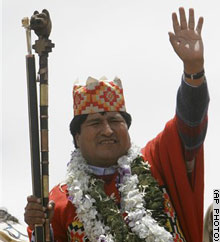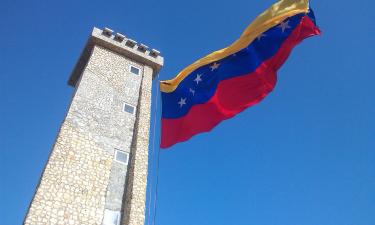Bolivia's Evo Morales, voted by the people and blessed by ancient gods
The country's first indigenous leader has taken part in an ancient religious ceremony ahead of his official inauguration
The new president of Bolivia, Evo Morales, vowed to put an end to colonialism, fight imperialism and liberate indigenous communities of the Americas, during the celebrations for his inauguration that took place during the weekend in the capital La Paz and the ancient sacred site of Tiwanaku. “After 500 years of colonialism and oppression, we, the indigenous people of Bolivia, showed to the world that we were capable to seize power,” said the first indigenous leader of South America's poorest nation in 180 years of independent history.
Ahead of his official inauguration as the new president of Bolivia on Sunday, Morales took part of an ancient ritual where himself an Aymara Indian was blessed by an Aymara priest in a colourful ceremony that gathered 25,000 supporters at the 'gate of the sun' in the pre-Inca ruins of Tiwanaku near Lake Titicaca. There, Morales arrived dressed in a bright red tunic worn only by pre-Inca priests, thanked the Pachamama – Mother Earth – by pouring liquor, coca leaves and food into the soil and received the blessing of the ancient gods that are still popular among indigenous Bolivians.
Blessed Morales promised to seek “equality and justice” for poor Bolivians and vowed to re-write country's constitution this year. “The native people demand that we found Bolivia over again, and for that we will set up an assembly on Aug. 6 to change the constitution,” Morales said to the crows from the ruins of the 1,000-year-old sacred site.
“Today, thanks to the Pachamama, the consciousness of the Bolivian people won the elections and that will change hour history of suffering and exploitation,” said Morales, as his supporters replied with chants in Aymara and Spanish. Making use of his habitual moderate style, Evo, as Bolivians called him, said that his people – the Aymara - was not rancorous and that he will govern “for the benefit of all the Bolivians.”
Representatives from indigenous communities from Latin America and the US celebrated Morales' ceremony as offered him symbolic gifts. The leader of the Guatemalan Mayas gave Morales a bag where his community preserves the popol vuh, the ancient book of the empire disappeared even before the Spanish conquest.
From there, Morales moved to the town of Tiwanaku, where he could taste a peace of the 10 meters long cake made of quinua, a popular crop grown by locals in the Bolivian highlands. “We want to show the world that Bolivia is not only a gas-rich country, but also a producer of nutritive crops as the quinua,” told Pravda.Ru, Mari Carrasco, the leader of Mothers for the Change association.
The official celebrations
As the religious ceremony finished, La Paz, the breathtaking capital of Bolivia some 4,000 meters above the level of sea, was preparing to receive leaders from Latin America, Spain and, Slovenia as well as delegations from the fourth corners of the world. In the historical heart of the city, a gem of Spanish colonial architecture, the official inauguration took place at the Congress and the Palacio Quemado, the presidential palace still marked by the bullets of the popular uprising that ousted conservative leader Gonzalo Sanchez de Lozada in October 2003.
Among the Latin American leaders present in the ceremony were the president of Venezuela and Morales' close ally, Hugo Chavez, and the heads of state of Brazil and Argentina. Another relevant visit was the presence of the outgoing president of Chile, Ricardo Lagos, as both countries have no bilateral ties since the Pacific War in the late 1880s. In that conflict, the Chileans defeated Bolivia and Peru and took possession of all the Bolivian coastline, leaving thecountry landlocked.
Morales paid tribute to his ancestors and notable fighters “for the liberation of Bolivia” as Tupac Amaru and the Argentine revolutionary Ernesto Che Guevara, who died in Bolivian territory in 1967. In a relevant section of his two hours statement, Morales vowed to cooperate with the United States in the fight against cocaine and narcotraffick “without pressures and securing the normal development of the coca growers.” “We say no to cocaine, but yes to coca,” said the indigenous leader who jumped to the political scenario as the leaders of the coca growers. The coca leave is a traditional consumption in Bolivia, Peru and the northern provinces of Chile and Argentina for its medicinal and nutritive characteristics.
Voices from Bolivia
Miners, workers, clerks, farmers and indigenous communities, arrived in La Paz to take part of the celebration, which included the performance of popular artists in San Francisco square, where no less than 80 Bolivians were shot during the 2003 protests.
Some of them talked to Pravda.Ru in La Paz. “This is the first time that one of us will be president. I hope he could end with the corruption of the whites,” says Juan Mamani a 45-year-old farmer from Cochabamba, the hometwon of Morales, who speaks better ayamara than Spanish.
"We are the excluded and opressed, but we came here to celebrate because we are looking for changes for our poorest people," says Efrain Condori, a miner from the exhausted silver basin of Potosi. "Evo's inauguration is like the 1952's Popular Revolution but it will lead to deepen changes for our indigenous people," he remarks.
"This is the first time that we will live in democracy in 503 years of history," celebrates Roberto Aguilar, an aymara farmer from the coca region of Pacages. "We are all moved, specially by the Tiwanaku cermony because that is how our ancestrians taught to do."
For Wilfredo, a 55-year-old financial advisor, Evo's victory was possible by the consciousness of the urban middle-class. "Oligarchs lost power since the middle-class realized that they were corrupted," he says in reference to the administrations of Sanchez de Lozada and his predecessors.
From Sucre, the former educational center of the Spanish colonies in the eighteen century, arrived Marta, a 56 year-old teacher. “I hope Evo will fulfill his obligations as leader of the country. He must be honest, as our old proverb says: "Ama Ma'pa."
Everybody in La Paz repeats what Morales has been saying since he became a national political figure: “Don't steal, don't lie and don't be lazy.” If Evo puts in practice this proverb, Bolivians believe that they could enter in a new era, after 500 years of exploitation.
Morales and the indigenous issue
On Friday, the leaders of the indigenous communities of the Americas gathered in La Paz to celebrate Evo's victory as praised to rise their demands to global forums. Representatives of Brazil, Argentina, Guatemala, Honduras, Nicaragua, Colombia, Uruguay, Ecuador, Venezuela and the US, elected Morales as the leader of all the native peoples of the Americas and vowed to rise his candidature for the 2006 Nobel Prize.
“The indigenous issue has to be debated in all international forums because if we do not resolve the indigenous question in Latin America first, our countries will have no future at all,” said Morales at the closing session of the forum. “We want peace with social justice and dignify politics. The indigenous movement is the moral reserve of the world,” he concluded.
La Paz
Bolivia
Discuss this article on Pravda.Ru English Forum
Subscribe to Pravda.Ru Telegram channel, Facebook, RSS!




